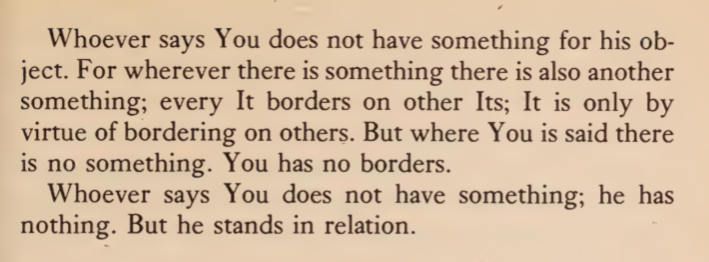i notice of grammatology on his bookshelf and ask if he is a derridean. he says it's only there as 'an ironic gesture' and that derrida is completely impossible to understand. he pulls the book off the shelf and opens it. it is full of notes in the margin, underlinings and highlights, but they're not mine! he says quickly. he doesn't ask if i'm a derridean, not that i would ever claim to be one, but i've read the work of mourning and if i could as much as “designate the crevice through which the yet unnameable glimmer beyond the closure can be glimpsed” (pp. 13–14) i would die happy.
in the middle ages there was a lecturer at the university of antwerp (or was it ghent?) who believed that the language spoken in the garden of eden was flemish
outside my window, high in a tree, two crows are building a nest — that is to say, one crow wrestles a large piece of a tree branch into place, as another watches.
when there are leaves the nest will be invisible.
after a while the crow watching flies off, then the other.
i wait for the crows to return and i wait for the leaves and for spring.
(from buber we may learn that it is still possible, sometimes, to say 'i'.)
i write :
> nice to hear from you. i am still in europe, relatively well and unreasonably happy.
goodbye marl
goodbye nullarbor dwarf —
and desert bettongs.
goodbye capricorn rabbit-rat.
goodbye long-eared mouse
broad-cheeked hopping mouse
and percy island flying fox.
goodbye liverpool plains striped —
south-eastern striped —
and nullarbor barred bandicoots.
link
someone wrote a book❊ about people who remember the exact moment, as children, when they realised they had a self — when they had the thought, i am an 'i'!
There was an annoying article in The Times (which I'm not even going to bother linking to but I did hack three sentences out of it) about how all kinds of unlikely people are referring to Foucault these days and making out like it's pretentious and/or you are a pseudo intellectuals if you do so. (Isn't it interesting how anti-intellectuals like to accuse people of being pseudo intellectual when it's real intellectuals that they actually hate?)
tegenwoordig kun je zeggen dat je een ietsist bent, d.w.z. dat je niet in god e.d. gelooft maar wel dat er 'iets' is. op deze manier kun je je ook onderscheiden van een nihilist die, of in het niets gelooft, of gewoon helemaal niets gelooft.
op zich heeft het ietsisme wel iets, maar door te zeggen dat het 'iets' is gebeurt er iets met dat iets... het zou namelijk betekenen dat dit iets het tegenovergestelde van niets is en wat voor mij belangrijk is, is dat dit iets ook het binaire overstijgt, dit is iets dat tegelijkertijd ook niets is — en dat tegelijkertijd ook geen van beide is.
en daarom ben ik geen ietsist.
I love this from the Guardian's agony aunt :
For all but the most self-deluded, identifying why we feel a certain way is not an insurmountable challenge. What does present difficulties is understanding how those deeply embedded experiences affect our choices, “natural” impulses and decision making.
And for this she says, it is useful to get help. But where and from whom do you get this help?
